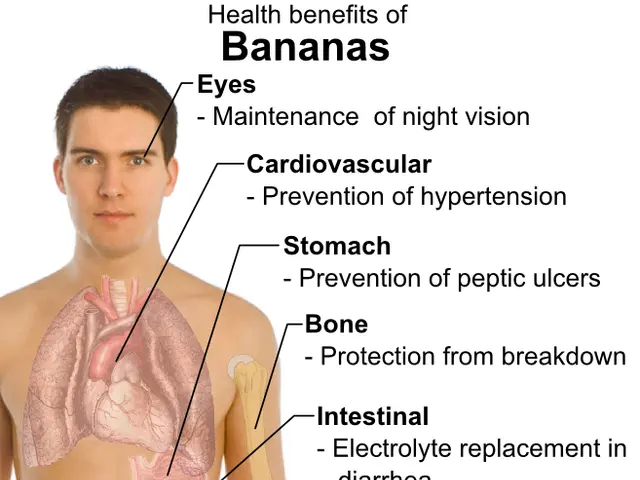Comparison between Keto and Mediterranean Diets: Potential for Lowering Blood Pressure
Swapping Sedentary Lifestyle for Heart-Healthy Nutrition:
Embracing a healthier lifestyle can significantly impact your blood pressure and overall heart health. In fact, researchers have linked both the Mediterranean and ketogenic diets to lower blood pressure and improved cardiovascular readings.
According to the World Health Organization, countless individuals worldwide struggle with high blood pressure, also known as hypertension. To combat this widespread issue, people are turning to various dietary approaches, such as the Mediterranean and ketogenic diets.
For instance, a research study published in April 2024 found that following a Mediterranean-style diet contributed to a significant reduction in high blood pressure. Similarly, another study in July 2019 indicated that a low-carbohydrate diet, like the ketogenic diet, reduced blood pressure readings in individuals with type 2 diabetes.
A recent study further buttresses these findings by offering evidence that both diets help lower blood pressure and improve cardiovascular health measurements in people who are overweight or obese. Indeed, this research was published in the renowned journal "Nutrients."
Dietary Composition Matters
Researchers recruited 26 adults with obesity or overweight, high blood pressure, and low-to-moderate cardiovascular risk scores. The participants were randomized to either follow the Mediterranean diet or the ketogenic diet for a period of three months.
Upon completion of the study, researchers noted that both diet groups experienced weight loss and a decrease in blood pressure. They also found an increase in fat-free mass and a decrease in body fat, blood lipid levels, and insulin concentrations in both groups.
However, it's worth mentioning that there was a difference between the two diets when it came to nocturnal dipping. Participants following the ketogenic diet had a higher level of nocturnal dipping, an indicator of healthy blood pressure regulation.
Cheng-Han Chen, a board-certified interventional cardiologist, highlighted the importance of nocturnal dipping, as its absence can increase the risk of heart disease. According to Chen, each dietary strategy may offer unique benefits for managing blood pressure, depending on the food preferences of an individual.
Reducing Carbs and Sugars Key to Weight Loss
The findings of this study align with the recommendations of Mir Ali, a board-certified general surgeon and medical director. Both diets emphasize reductions in carbohydrate and sugar intake as a means to encourage fat burning in the body.
To combat the rising issue of obesity, researchers emphasize the need for strategies like diet modifications to help tackle the burden of heart disease. Further research is necessary to determine the long-term benefits of both diets and confirm possible advantages on clinical outcomes.
Finding the Right Fit
While the Mediterranean and ketogenic diets show promise, they may not be suitable for everyone. Registered dietitian nutritionist Monique Richard encourages individuals to work with a professional to identify the most appropriate dietary pattern based on factors like current health conditions, lifestyle, and preferences.
In short, both the Mediterranean and ketogenic diets demonstrate potential for lowering blood pressure and improving heart health. By working closely with healthcare professionals, individuals can identify the dietary approach that's most suitable for their specific needs and preferences.
["Blood pressure management with dietary approaches": lecturer's note for an undergraduate Public Health course at a state university]["The Mediterranean and Ketogenic Diets for Cardiovascular Health": presentation for a continuing education conference for healthcare professionals focusing on diet and cardiovascular disease]["Myths and Misconceptions about the Mediterranean and Ketogenic Diets": blog post for a nutrition and lifestyle website targeting individuals seeking to make healthy changes]
- The Mediterranean and ketogenic diets have been linked to lower blood pressure and improved cardiovascular readings, providing a significant impact on blood pressure and heart health.
- High blood pressure, or hypertension, is a widespread medical condition that affects numerous individuals worldwide, and people are turning to these dietary approaches to combat it.
- Research suggests that both the Mediterranean and ketogenic diets contribute to weight loss, a decrease in blood pressure, and improvements in body composition, blood lipid levels, and insulin concentrations.
- Different dietary strategies may offer unique benefits for managing blood pressure; for example, individuals following the ketogenic diet experienced a higher level of nocturnal dipping, an indicator of healthy blood pressure regulation.
- Reducing carbohydrate and sugar intake is a key factor in both the Mediterranean and ketogenic diets, encouraging fat burning in the body.
- By working with healthcare professionals, individuals can identify the most appropriate dietary pattern based on their current health conditions, lifestyle, and preferences to manage blood pressure effectively and improve heart health.
- Further research is necessary to determine the long-term benefits of both diets and confirm their potential advantages on clinical outcomes.
- From a public health perspective, diet modifications like the Mediterranean and ketogenic diets play an essential role in reducing the burden of heart disease and improving overall health and wellness, as well as managing chronic diseases like obesity and hypertension.








